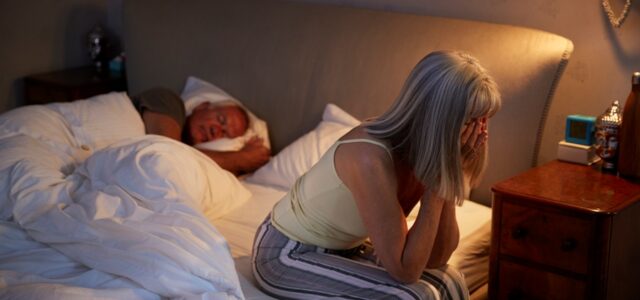Call for your appointment today 914-666-4665 | Mt. Kisco, New York

Dr. Robert Bransfield, a New Jersey-based psychiatrist who specializes in the diagnosis and treatment of tick-borne illnesses, has seen a broad range of sleep disorders in Lyme disease patients treated at his practice. He describes the various sleep disorders in the article “Neuropsychiatric Lyme Borreliosis: An Overview with a Focus on a Specialty Psychiatrist’s Clinical Practice.” [2]
The patients experienced:
- Non-restorative sleep
- Early insomnia
- Middle of the night insomnia
- Early morning insomnia
- Excessive daytime sleepiness
- Loss or reversal of circadian rhythm
- Restless leg
- Paroxysmal nocturnal limb movements
- Sleep apnea (central and/or obstructive)
- Sleep paralysis
- Hypnagogic hallucinations
- Sleep attacks
- Cataplexy
- Narcolepsy
The combination of “non-restorative sleep and chronic unremitting stress appear to play a significant role in disease progression,” explains Bransfield.
[bctt tweet=”Lyme disease patients may experience a broad range of sleep disturbances. ” username=”DrDanielCameron”]
“Both non-restorative sleep and the chronic unremitting stress seen in these chronically ill patients contribute to disease perpetuation and progression and are associated with fatigue, cognitive impairments, decreased regenerative functioning, compromised immunity, decreased resistance to infectious disease and neurodegenerative processes,” he writes.
Editor’s note: I have also found that Lyme disease patients can suffer from a broad range of sleep disorders. However, it can be difficult to determine whether Lyme disease or a comorbidity is responsible for the sleep disturbance. I have found that antibiotic treatment often improves sleep disorder symptoms.
Related Articles:
References:
- Weinstein ER, Rebman AW, Aucott JN, Johnson-Greene D, Bechtold KT. Sleep Quality in Well-defined Lyme Disease: A Clinical Cohort Study in Maryland. Sleep. 2018.
- Bransfield RC. Neuropsychiatric Lyme Borreliosis: An Overview with a Focus on a Specialty Psychiatrist’s Clinical Practice. Healthcare (Basel). 2018;6(3).




This has been a problem for me. Since have a long disease I can’t seem to fall asleep and wake several times during the night I am over the top trying to find sleep remedies
I have had Lyme Disease for 20 years and am dealing with all of the symptoms that everyone else is dealing with, but, I can’t seem to overcome the depression. Does anyone have any suggestions on natural treatments for Lyme related depression?
5 htp helps me some
Hi Missy,
I realize your post is 2 years old and I hope you are doing well. I have had some luck with CBD oil. I take 6000mg/day. Find a credible and knowledgeable source (my LSLD MD directed me to a credible source), as you should not be ordering this product online without any knowledge of what you are doing. I started on a very low dosage and worked my way up till an array of symptoms (joint pain, arthritis, GI issues, depression, etc.) started to taper off.
Missy, I have lyme since 2013 , the days seem to be getting longer, i get past the depression by think of the people that i know have been paralized, head injurys , strokes that would give there right arm to have only lyme disease, help kept the depression part of my head in check.Try to treat you sell every chance you can afford to, and think of the positive times / things that lay in the days ahead of you
God Bless.
God bless
An amino acid called L- Theanine 200mg OTC works for the sadness & depression Lyme disease creates.
the lyme illness and epstein barr have been present for me since July of this year. In the last two months Ive had insomnia related problems ongoing. I have been on several antibiotics, changed my diet, yet still cannot function to work full time. I have night sweats, and pretty much might get four hours of sleep on a good night. I am implementing self help tools such as meditation, eft, tapping, and other personal development work, but I remain unable to sleep through the night. My body tingles and wakes me up regularly. I have a coaching business and can barely run this at the present time. I am taking suggested herbals, and am about to try another sleep aid since trazedone has not worked that well. Before the lyme and epstein barr had hardly been sick very rarely. Yet I am aware that these infections ht at cross road times and don’t happen always at the bite of the tick for lyme. Any help would be great!
I have found treatment for Babesia helpful for some patients. The sweats sometimes suggested Babesia. I also look for other illnesses. I also evaluate for other illnesses and seek consultations for other illnesses. Call my office at 914 666 4665 if you have any questions.
I have had chronic Lyme for 20 years, as I get older it gets worse. Long hibernation sleeps, bone deep fatigue
I have had LD for over 30 years. I was bitten in Scarsdale NY, and perhaps multiple times more as our house backed up to a wooded reserve with a variety of woodland animals. At present and over the years, I’ve developed an increasing serious and frightening sleep awakening panic attack like syndrome. I’ve been given an anti anxiety pill which is my only help. For fibromyalgia I have another pill for the deep aches and pain despite massage and swimming when possible in NY.
No one understands this ‘sleep to awake’ anxiety attack syndrome but it is paralyzing and causes me to shake and shiver (sweats during night). Now confined mostly at home. We are now in Clearwater Florida because of a disastrous fire in our apt bldg in Bronxville NY in 2019.
Remarks or comments welcome. I’ve been seen by the best lyme literate doctors in Westchester county and one in Manhattan. None had a clue except it could be continued Babesia and/or Bartonella.
I am sorry to hear you are still sick. My Lyme and tick borne disease patients often feel tired and wired likely from a fight or flight like response. It is a tough life if antibiotics treatment fails.
Is antibiotic treatment for recent tick bitten patients only?
A single dose of doxycycline was proposed for a tick bite if found within 72 hour. I have been opposed to a single dose of doxycycline until evidence emerges that a single dose can prevent Chronic Neurologic Lyme. I have to use clinical judgement to determine if treatment is necessary and for how long.
Omg
I’ve been awake for 52 days. I’m so miserable. I do not know what to do. I have had Lyme disease 33 years & was re-infected 5 years ago. I had a bulls eye ring huge. Went to ER & they laughed at me. I use to get medication, but not anymore. I was in hospital 8 days on IV antibiotics. I had Rocky Mtn too & had only 20% life expectancy. That was 33 years ago. I’m an RN retired & mother of 3 children grown. My 34 yo daughter has incurable brain cancer. If I don’t get sleep soon I feel like I’m going to die. I have Mitral valve prolapse. My heart has palpitations constantly. Idk where to get any help. There’s crazy treatments for Lyme like dialysis & chemo. I need sleep.
Thank you,
Cheryl
I have not used diagnosis or chemo.
Hi, I don’t know if you’ve researched various alternative treatments, but sun lamps are known to help with different issues, including resetting circadian rhythm. I have chronic lyme and use mine for 20 minutes every morning in bed when I wake up. Soaking in Epsom salt may help relax you before bed as well, and help detox at the same time. Perhaps you’ve tried these things already, and maybe it’s so severe with you that it won’t touch your issues. I figured I’d offer the suggestion anyway. I’m so sorry you’re suffering this way, and about your daughter as well. Relaxing your nervous system is extremely important, as it affects your immune system nevatively, which will make lyme symptoms worse. Probiotics, supplements, vitmains, diet changes are extremely important. You can find what supplements to use and what the lyme diet is online. Its important to heal at a cellular level, because thats where lyme hides. Unfortunately the medical system fails people with lyme time and time again. Most doctors are not lyme literate and don’t know how to properly treat it, which is why I still have it even though I was treated right away. Now it’s too late for antibiotics to work. Marijuana can also help as well, especially with sleep. It’s good that it’s legal now. Take such, such good care of yourself, mama. Good luck.
My friend has Lyme and isn’t able to sleep now.
Would you be willing to talk to her?
Maybe you have a suggestion that will help her.
She’s talking about not “dealing” with it anymore
I can give you a number through my email.
Please and thank you ❤️
Hi Sue,
I have had Lyme for many many years like you and experience these horrendous ‘panic attacks’ which wake me up in the night. I believe it is cortisol hitting the enotoxins floating around your body which are produced as you sleep. My sleep has been has been hugely improved though by taking high quality magnesium glycinate ( a double dose taken throughout the day) and by wearing high quality blue light blocking glasses in the afternoon and evening.. The glasses have been so very helpful. All the very best . Such a tricky disease to live with and navigate
Twenty years ago gynecologist and urologist thought that I had Lyme disease but hospital test for it was negative but that test was not reliable and both agreed I had Lyme disease and gave me antibiotics. Fast forward to now I have autoimmune diseases, two strokes,fibromyalgia, etc no one helps. It is 6 am and no sleep. I need help
I advise my patient with similar histories to include a doctor experienced in chronic Lyme disease manifestations.